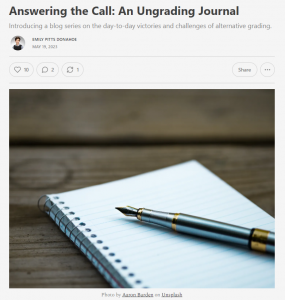by Emily Donahoe, associate director for instructional support
Last week, Josh Eyler and I facilitated a reprise of our workshop on “Getting Started with Alternative Grading Approaches,” a topic we’re both pretty passionate about. You can review our slides here. What follows are some highlights from this workshop.
We’ve defined “alternative grading,” in contrast to “traditional grading,” as a set of practices designed to center student growth through some combination of revision, multiple attempts, significant feedback, student reflection, and mastery of skills and dispositions. These models strive to decenter the grade itself and instead prioritize learning.
Because grading touches so many areas of our practice as teachers, and because implementing new models requires a significant time investment, we thought it was important to consider three things before deciding what kind of alternative grading approach might work best for you:
- Your beliefs about learning: How do people learn best? What conditions are most conducive to learning? What student and instructor actions best promote learning? What roles do student agency, failure, metacognition, etc. play in learning?
- Your desired outcomes for student learning: What competencies or dispositions do you most want students to develop? Agency and autonomy? Metacognition? Self-motivation? Love of learning? The possibilities are endless.
- Your teaching contexts: What are the expectations of your colleagues? What are your social identities? At what career stage are you? What are your typical class sizes? What time do you have to devote to new teaching methods?
Answering questions like these can provide a strong foundation for making decisions about your grading system.
We also introduced some common features of alternative grading models, as delineated by Robert Talbert and David Clark, authors of the new book Grading for Growth. Talbert and Clark suggest that grading for growth is based on four pillars:
- Clearly defined standards
- Helpful feedback
- Marks that indicate progress
- Reattempts without penalty
You can read more about these pillars in Talbert and Clark’s book or on their Substack.
Finally, Josh and I introduced four different alternative grading approaches:
-
- Labor-based contract grading: A system in which student grades are based on the amount of labor they undertake in the course rather than evaluations of the quality of individual assignments, with expectations laid out at the beginning of the semester through a grade contract.
- Specifications/Mastery/Standards-based grading: Three closely related systems in which student grades are determined by demonstrations of competency on specific outcomes, through multiple attempts and continuous feedback across the semester.
- Ungrading (or collaborative grading): In which students engage in supported self-assessment and determine their final course grade collaboratively with the instructor, often by presenting evidence of their learning in an individual conference.
- Portfolio grading: In which students continuously revise and improve their work across the semester for inclusion in a final portfolio, the overall quality of which determines their final grade.
These approaches aren’t necessarily “plug and play”: instructors should feel free to take the elements of each practice that work for them and leave the rest. And if you’re not ready to jump feet first into a new grading system, there are plenty of things you can do to start minimizing grades in your courses: assign work that receives feedback but no grade, for example; build in opportunities for self-assessment; or allow revisions and re-takes when possible.
To help instructors learn more about these practices, we also put together an alternative grading bibliography with lots of great resources. You can also read about these practices in our workshop slides. If you’d like additional support in developing a new approach to grading in your course, don’t hesitate to reach out to us at cetl@olemiss.edu to schedule a consultation!

